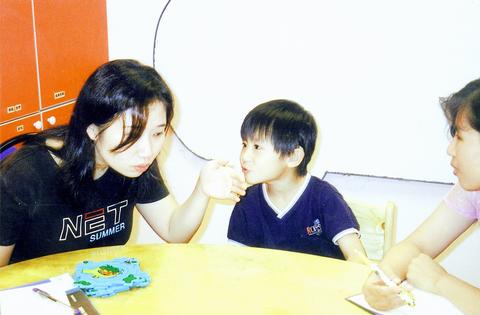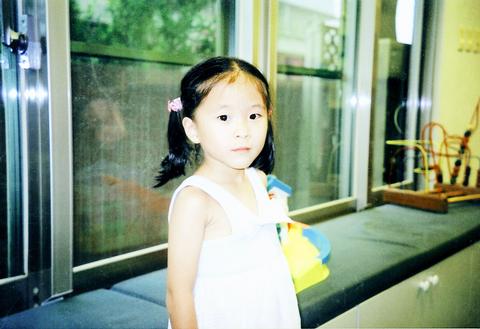When Ho Hsin-yu (
As a toddler, Hsin-yu seemed to be as curious and active as other toddlers. She began to speak at a normal age, but her parents slowly discovered speech problems. When speech therapy failed, the speech therapist presented her parents with the possibility that she was deaf. After tests, it was confirmed that Hsin-yu was severely deaf. Her parents were confused because the cause of her deafness was unknown. They were also worried about the limitations it presented to Hsin-yu's future.
Hsin-yu's parents were informed that she still had a chance of learning to hear and speak, and were introduced to auditory-verbal therapists at the Children's Hearing Foundation. Now almost five years old, Hsin-yu can hear with the help of a hearing aid and can speak as fluently as other children her age. Since April this year, Hsin-yu has been attending regular kindergarten. She has become more outgoing, and loves playing with her classmates. Her mother said that classmates were accepting of her, and that Hsin-yu has no problem keeping up in class. She will be able to attend an elementary school with non-deaf children when she is older. Being able to interact with other children is an opportunity few deaf children are given.

PHOTO: DIANE CHANG, TAIPEI TIMES
A new departure
The Children's Hearing Foundation was founded by Joanna Nichols and her husband Kenny Cheng in 1996 to teach Taiwan's hearing impaired children to speak and hear through auditory-verbal (AV) therapy. A learning center was established, with a team of audiologists and auditory-verbal therapists who provide regular checkups and weekly sessions without payment. A second center was built in Kaohsiung last year. Besides giving lessons and providing checkups, the foundation also holds periodical seminars and discussion sessions for parents to discuss issues and share experiences.
The founder of the Children's Hearing Foundation, Joanna Nichols, was a California native who moved to Taiwan in 1977 and married a Taiwanese man, Kenny Cheng. After their profoundly deaf daughter learned to hear and speak with the help of a Canadian auditory-verbal therapist, Nichols decided to give other hearing impaired children the same opportunity, by introducing the Canadian methods to Taiwan. Hoping that the foundation would one day help deaf children throughout Asia, Nichols and her husband invested a great deal of time and money. But after Nichols learned that cancer was to take her life, students have had to pay a basic fee of NT$700 for each one-hour session since March this year. The foundation continues to provide financial aid for families who cannot afford the fee.

PHOTO: DIANE CHANG, TAIPEI TIMES
The Children's Hearing Foundation is the first organization in Taiwan to focus exclusively on teaching deaf children to hear and speak. Because schools for the deaf in Taiwan generally accommodate students with multiple disabilities and profound or complete deafness, AV therapy cannot be used effectively. These students are taught through other methods and given job training, but they do not acquire the full range of abilities non-deaf students have. Using auditory-verbal therapy, the foundation helps deaf children overcome the disability that limits their capabilities and actions.
Most children are able to return to regular schools after some years of AV therapy. "A child who is taught using AV therapy is able to communicate verbally, so his education, profession and marriage will not be different from ours. Because the child is not isolated from society along with other deaf people, he has a chance to become more accomplished," said Wu Hsu-feng (吳淑芳), chief therapist at the foundation.
Building on potential
Since 95 percent of hearing-impaired persons have some potential hearing ability, some hearing can be restored if a hearing aid is used and this remaining ability is exercised through auditory-verbal therapy. By constantly repeating simple sounds to children, auditory-verbal therapists stimulate the auditory nerves and help develop a sensitivity to sound.
Because this stimulation has to be constant, parents play a large role in the process, and are required to attend sessions with the child. In comfortable and colorful classrooms, therapists use toys and other props to help children make a connection between the sounds they hear and common objects. Therapists and parents cover their mouths when speaking to prevent children from lip-reading. When a child starts to repeat sounds, therapists help them refine pronunciation. Themed classrooms, set up like a bedrooms, a living room and a fully equipped kitchen can help children practice speaking and listening in realistic situations.
Auditory-verbal therapy is most effective with young children and infants because the crucial period in language development occurs before the age of six. By the time a deaf child reaches its teens, they have often developed a reliance on other senses, and do not depend on sign language or lip-reading to communicate. The foundation currently has students up to the age of 14.
With more than 150 students and 20 teachers in Taipei alone, the Children's Hearing Foundation continues to train teachers and aims to reach out to deaf children throughout Taiwan. With centers soon to open in Ilan and Taichung, the foundation is searching for alternate sources of funding. With persistence and a lot of patience, the staff at the Children's Hearing Foundation continue to work toward goals like making hearing tests available for newborns in more hospitals and collaborating with different city and county governments. Wu also said that in the long term, "we hope the foundation will become a resource center for deaf children throughout Asia."

Towering high above Taiwan’s capital city at 508 meters, Taipei 101 dominates the skyline. The earthquake-proof skyscraper of steel and glass has captured the imagination of professional rock climber Alex Honnold for more than a decade. Tomorrow morning, he will climb it in his signature free solo style — without ropes or protective equipment. And Netflix will broadcast it — live. The event’s announcement has drawn both excitement and trepidation, as well as some concerns over the ethical implications of attempting such a high-risk endeavor on live broadcast. Many have questioned Honnold’s desire to continues his free-solo climbs now that he’s a

As Taiwan’s second most populous city, Taichung looms large in the electoral map. Taiwanese political commentators describe it — along with neighboring Changhua County — as Taiwan’s “swing states” (搖擺州), which is a curious direct borrowing from American election terminology. In the early post-Martial Law era, Taichung was referred to as a “desert of democracy” because while the Democratic Progressive Party (DPP) was winning elections in the north and south, Taichung remained staunchly loyal to the Chinese Nationalist Party (KMT). That changed over time, but in both Changhua and Taichung, the DPP still suffers from a “one-term curse,” with the

Lines between cop and criminal get murky in Joe Carnahan’s The Rip, a crime thriller set across one foggy Miami night, starring Matt Damon and Ben Affleck. Damon and Affleck, of course, are so closely associated with Boston — most recently they produced the 2024 heist movie The Instigators there — that a detour to South Florida puts them, a little awkwardly, in an entirely different movie landscape. This is Miami Vice territory or Elmore Leonard Land, not Southie or The Town. In The Rip, they play Miami narcotics officers who come upon a cartel stash house that Lt. Dane Dumars (Damon)

Today Taiwanese accept as legitimate government control of many aspects of land use. That legitimacy hides in plain sight the way the system of authoritarian land grabs that favored big firms in the developmentalist era has given way to a government land grab system that favors big developers in the modern democratic era. Articles 142 and 143 of the Republic of China (ROC) Constitution form the basis of that control. They incorporate the thinking of Sun Yat-sen (孫逸仙) in considering the problems of land in China. Article 143 states: “All land within the territory of the Republic of China shall